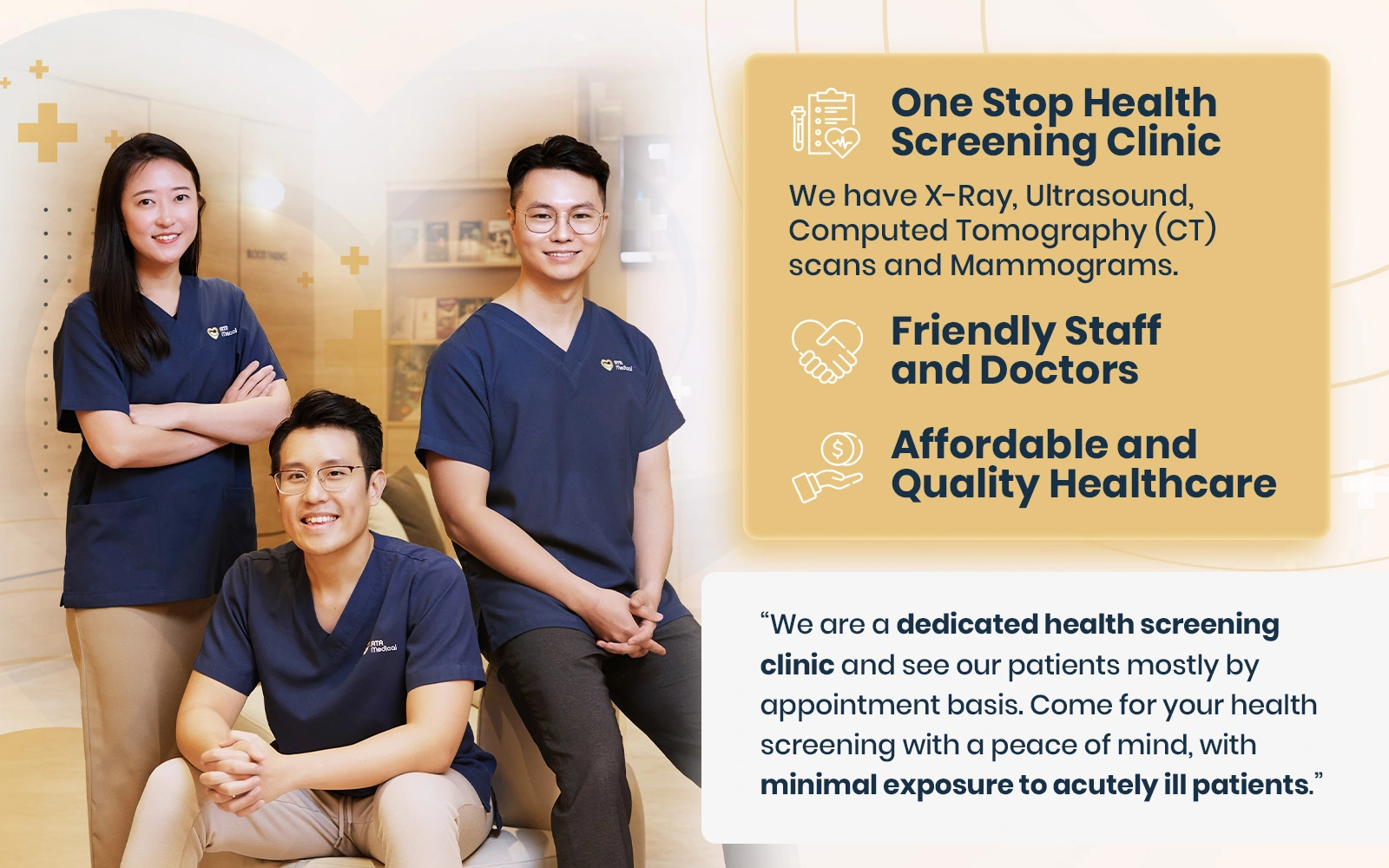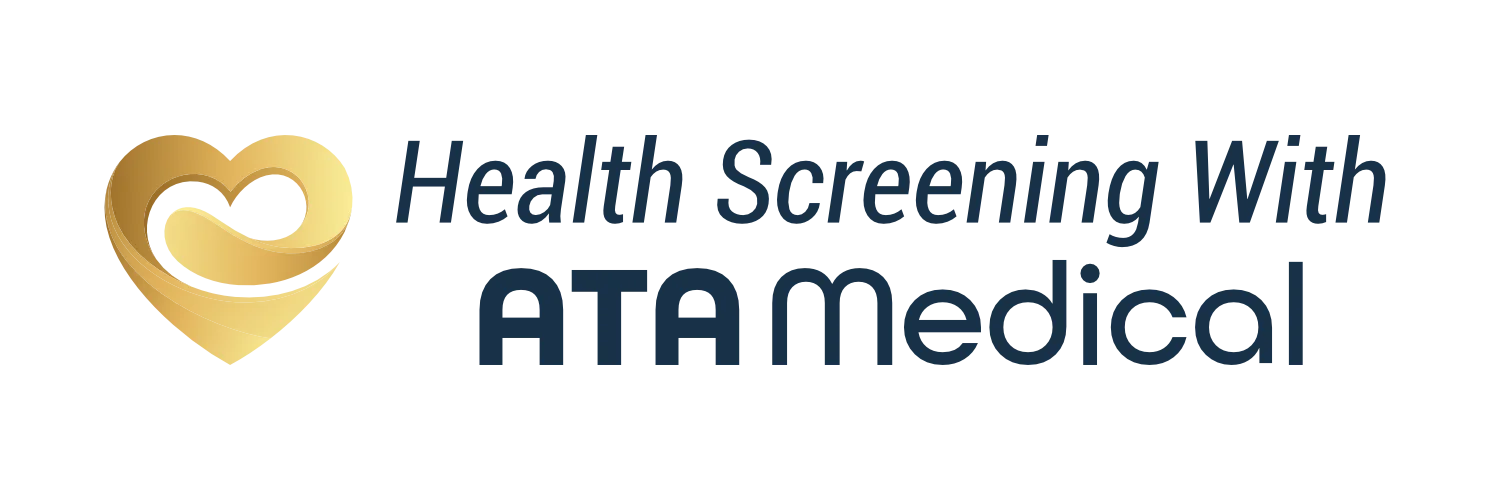Heart Screening Singapore
Heart health screening is a series of tests and assessments that evaluate your cardiovascular
health, detect potential heart conditions, and identify risk factors early.
In 2022, nearly one in three deaths in Singapore was
linked to cardiovascular disease, highlighting the importance of regular screenings. Understanding your
heart health status allows you and your doctor to take proactive measures to lower risks and
maintain long-term cardiovascular wellness.
At healthscreening.sg, we offer a range of heart health screening tests tailored to assess your
cardiovascular function and overall risk profile.
Why Is Heart Health Screening Important?
Regular heart health screening can help to:
- Detect cardiovascular risk factors such as high blood pressure, high cholesterol, diabetes, or irregular heart rhythms, even if you have no symptoms
- Support prevention by enabling your doctor to recommend diet, exercise, and lifestyle adjustments to reduce long-term risk
- Track changes in your cardiovascular health over time to detect emerging issues
- Monitor the progression of known heart-related conditions to guide treatment

Who Should Consider Heart Health Screenings?
Heart health screenings are typically recommended for adults over the age of 40, or earlier if you have specific risk factors. You should consider a screening if you:
- Have a family history of heart disease or stroke
- Have chronic conditions such as high blood pressure, high cholesterol, or diabetes
- Have a history of smoking or heavy alcohol consumption
- Have excess body weight or are obese
- Lead a sedentary lifestyle with little physical activity
- Experience symptoms such as chest discomfort, shortness of breath, or unusual fatigue
Even without symptoms, individuals with multiple risk factors may benefit from periodic screening to establish a baseline and monitor changes over time.
Our consultation fees start from $38.15 (teleconsultation) or $49.05 (clinic consultation), NETT.
Types of Heart Health Screenings


Heart health screening usually involves a combination of a physical examination, blood tests, and specialised imaging assessments.
| Test | Purpose | How It Works |
|---|---|---|
| Physical Examination and Medical History | Assess general health and identify lifestyle or hereditary risk factors. | Review of lifestyle and family history, measurement of blood pressure, weight, and BMI. |
| Blood Tests | Detect biochemical risk factors such as high cholesterol, diabetes, and kidney problems that can affect heart health. | Blood sample(s) are collected and analysed in a laboratory. |
| Electrocardiogram (ECG) | Detects abnormal heart rhythms and signs of previous heart attack, reduced blood flow, or thickened heart muscle at rest. | Measures the heart’s electrical activity using small electrodes placed on the chest, arms, and legs. |
| Treadmill Stress Test | Assess heart function to detect reduced blood flow or abnormal rhythms during physical exertion. | Involves conducting an ECG and measuring heart rate and blood pressure while walking on a treadmill or cycling. |
| Carotid Intima-Media Thickness (CIMT) Test | Assess the thickness of the carotid arteries in the neck. | Uses ultrasound to scan the carotid arteries in the neck and measure the thickness of the inner artery wall layers (intima and media). |
| 2D Echocardiogram | Assess heart structure, pumping efficiency, and valve function. | Uses ultrasound waves from a probe placed on the chest to create moving images of the heart. |
| CT Calcium Score Test | Assess calcium deposits in the coronary arteries to estimate the extent of plaque build-up. | Uses a CT scanner to take detailed X-ray images of the heart to calculate a calcium score. |
| CT Coronary Angiogram (CTCA) | Checks for narrowing or blockages caused by calcified or non-calcified plaque. | Involves injecting a contrast dye into a vein before a CT scanner produces detailed images of the arteries. |
How Often Should You Go for a Heart Check-Up?
The frequency of heart screening depends on your age, health status, and risk factors. Those with higher risk factors may need annual or more regular reviews, even before the age of 40. It is advisable to consult a doctor, who can recommend a suitable schedule based on your individual needs.
How Much Does Heart Health Screenings Cost?
At healthscreening.sg, we offer a range of heart health screenings, with the prices as follows:
| Test | Price* |
|---|---|
| Consultation | From $49.05 |
| Blood Tests & Profiles | |
| Apolipoprotein B | $32.70 |
| Lipoprotein (a) | $59.95 |
| Homocysteine | $74.12 |
| HsCRP | $38.15 |
| Fasting Insulin | $66.49 |
|
Essential Lipid Profile: Full Cholesterol Test (Total, LDL, HDL, Triglycerides, HDL Ratio) |
$21.80 |
|
Cardiac Screening 3: Essential Lipid Profile + Apolipoprotein B (ApoB) + HsCRP |
$63.22 |
|
Cardiac Screening 4: Cardiac Screening 3 + Homocysteine + Fasting Insulin + Glucose Note: Fasting is required for accurate results of Fasting Insulin and Glucose. |
$172.22 |
| [Optional] Mobile Blood Drawing Service | $54.50 (per location up to 5 pax) |
| Specialised Tests & Imaging | |
| Electrocardiogram (ECG) | From $49.05 |
| Treadmill Stress Test with ECG | From $218 |
| Carotid Intima-Media Thickness (CIMT) Test | From $163.50 |
| 2D Echocardiogram | From $436 |
| CT Coronary Angiogram | From $1,384.30 |
| CT Calcium Score Test | From $403.30 |
*Prices are NETT and inclusive of GST.
^Prices last updated on
Jan 28, 2026. While every effort is made to keep pricing information up to date, please contact our team to confirm the latest rates.
Find Heart Health Screening Near Me
Why Choose Us?








Navigate Easy With Google Maps
Health Screening Singapore (Anson House)
Nearest MRT: EW15 Tanjong PagarHealth Screening Singapore (Camden Medical Centre)
Nearest MRT: TE13 Orchard BoulevardHealth Screening Singapore (CPF Jurong Building)
Nearest MRT: NS1/EW24 Jurong EastFrequently Asked Questions (FAQ)
Heart screening costs in Singapore vary depending on the tests included and the healthcare provider. Prices typically range from under $100 for a basic ECG to over $1,000 for advanced imaging such as a CT coronary angiogram. At healthscreening.sg, we offer heart health screening options ranging from blood tests to specialised imaging. Contact us for more information or to book an appointment.
Heart screening tests in Singapore are assessments that check for cardiovascular risk factors, structural abnormalities of the heart, and signs of heart disease. Common components include a physical examination, blood tests, an electrocardiogram (ECG), and imaging such as echocardiograms or CT scans. The suitability of specific tests depend on your risk factors and symptoms.
A typical heart screening includes a physical examination, review of medical history, and tests such as blood work for cholesterol and glucose levels, an ECG, and imaging like echocardiograms or CT scans. Additional specialised tests may be recommended based on your risk profile and symptoms. Consulting a doctor can help determine which screenings are most relevant for you.
Heart scans can be valuable for detecting early signs of heart disease, even before symptoms occur, allowing for timely prevention or treatment. Their usefulness depends on your age, risk factors, and symptoms. Consulting a doctor can help determine which heart health screenings are appropriate for your individual health circumstances.
Heart screening is generally recommended for adults aged 40 and above, or earlier if you have significant risk factors such as high blood pressure, high cholesterol, diabetes, smoking history, or a family history of heart disease. If you are unsure, it is best to consult a doctor to determine the most appropriate timing and relevant tests based on your personal risk profile.
There is no single “best” heart screening test, as each assesses different aspects of heart health. ECGs evaluate electrical activity, echocardiograms assess structure and function, and CT scans detect calcium or blockages. The right choice depends on your symptoms, risk factors, and medical history. It is advisable to consult a doctor to determine the most appropriate test.
Atherosclerosis is pronounced “ath-uh-roh-skluh-ROH-sis.” The word comes from the Greek terms athero (meaning paste or gruel, referring to fatty deposits) and sclerosis (meaning hardening). Together, it describes the hardening and narrowing of arteries due to plaque build-up.
The most reliable way to assess heart health is through a combination of medical history review, physical examination, and diagnostic tests such as blood work, an electrocardiogram (ECG), or imaging. Consulting a doctor can help determine the most appropriate tests based on your health needs.
A heart screening at healthscreening.sg typically takes between 30 minutes and two hours during off-peak hours, depending on the number and type of tests performed. Basic screenings such as an electrocardiogram (ECG) are relatively quick, while more advanced screenings involving imaging or stress tests may require extra time for preparation and rest between procedures. Our staff will provide more detailed information when you book your appointment.
The appropriate attire for a heart screening depends on the tests scheduled. Wear comfortable, loose-fitting clothing that allows access to the chest, arms, and legs for tests. If undergoing a treadmill stress test, wear exercise-appropriate attire and sports shoes. For other advanced imaging scans, you may be required to change into a gown and remove all metal objects. You should also avoid applying lotions or powders, as these can interfere with electrode or ultrasound contact. Always follow your clinic’s specific instructions to ensure a smooth and efficient screening process.
A full heart check-up is a comprehensive assessment of cardiovascular health, often combining a physical examination, blood tests, an electrocardiogram (ECG), and imaging such as echocardiograms or CT scans. The specific tests recommended depend on your individual risk profile. It is advisable to consult a doctor to determine which tests are most relevant for your health needs.
The cost of a heart scan in Singapore varies depending on the test type and healthcare provider. An ultrasound-based 2D echocardiogram typically costs a few hundred dollars, while more advanced scans such as CT angiograms can exceed $1,000 at private clinics. You should confirm the latest costs with your chosen healthcare provider.
An ultrasound of the heart, known as a 2D echocardiogram, typically costs a few hundred dollars in Singapore, depending on the healthcare provider. At healthscreening.sg, prices start from $436 for a 2D echocardiogram, with consultation fees starting from $49.05.
A CT scan of the heart in Singapore typically ranges from a few hundred dollars to over a thousand dollars, depending on the type of scan and healthcare provider. At healthscreening.sg, prices start from $403.30 for a CT calcium score and $1,384.30 for a CT coronary angiogram, with consultation fees starting from $49.05.
